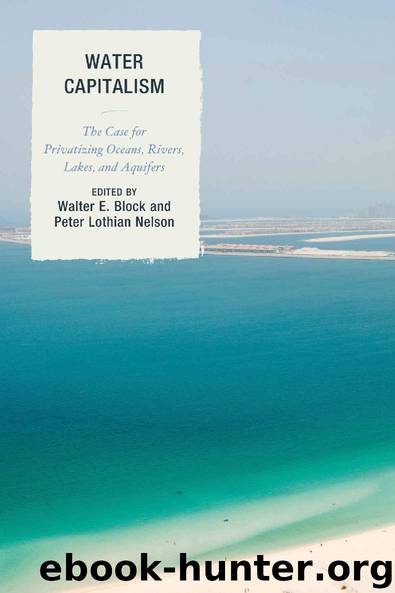Water Capitalism: The Case for Privatizing Oceans, Rivers, Lakes, and Aquifers (Capitalist Thought: Studies in Philosophy, Politics, and Economics) by Walter E. Block & Peter L. Nelson

Author:Walter E. Block & Peter L. Nelson [Block, Walter E.]
Language: eng
Format: epub
Tags: undefined
Publisher: Lexington Books
Published: 2015-10-30T00:00:00+00:00
Why Piracy?
How does piracy fit into this sad situation? Most Somalis view their problems as stemming at least in part from foreign intervention: first from colonial masters, Britain and Italy, then from Russia, and finally from America and the U.N., Somalis, speaking in generalization, view all of these as well as current interventionists, India, Italy, the United States, France, the United Nations, etc. as booty seekers[101] attempting to steal resources from their country. Fishermen feel threatened, and have suffered attack by international naval forces (Appleton 2012).
The pirates are viewed locally as protectors of the waters around their land and enjoy a legitimacy based on that perception. In other words, those who are regarded by international communities as pirates are more akin to privateers[102] from the Somali viewpoint. For the benefit of their economy, these adventurers, especially western trespassers, are looked upon as violent invaders who are seen as intent on subjugating the local population to facilitate carting away resources.
The local stationing of powerful modern destroyers and guided missile frigates only intensifies the suspicion of the native denizens. Since there is no way for them to contend directly with such military might, they must wage asymmetric warfare (Rand Corp. 2013). By posing as fishing boats, which they are when not in attack mode, they can inspect unarmed merchant ships; and when no one is looking, they will strike. They assault their enemy where he is weakest and thus gain strength even as their opponent is most feeble.
The competing programs of Somalis protecting their natural resources via “privateering” and the west defending its shipping via modern navies enables the issues and the violence. Both sides have “right on their side,” of course.
Somaliland,[103] the western portion of the north extension along the gulf, differs from the rest of Somalia. There a desire for recognition by the larger international community has added legitimacy to the counter piracy initiatives. However, because of the overlap between the objectives of pirates and entrepreneurs, both piracy and countermeasures can damage the people and their economic well-being. The rest of Somalia including Puntland, the United Islamic Courts (UIC), and areas allied with UIC are not seeking independent recognition, so the same dynamics do not apply. There is a Federal Government of Somalia which has its capital in Mogadishu and is recognized internationally but which faces widespread approbation and armed resistance.[104]
Download
This site does not store any files on its server. We only index and link to content provided by other sites. Please contact the content providers to delete copyright contents if any and email us, we'll remove relevant links or contents immediately.
International Integration of the Brazilian Economy by Elias C. Grivoyannis(109979)
The Radium Girls by Kate Moore(12018)
Turbulence by E. J. Noyes(8040)
Nudge - Improving Decisions about Health, Wealth, and Happiness by Thaler Sunstein(7690)
The Black Swan by Nassim Nicholas Taleb(7106)
Rich Dad Poor Dad by Robert T. Kiyosaki(6607)
Pioneering Portfolio Management by David F. Swensen(6288)
Man-made Catastrophes and Risk Information Concealment by Dmitry Chernov & Didier Sornette(6005)
Zero to One by Peter Thiel(5786)
Secrecy World by Jake Bernstein(4741)
Millionaire: The Philanderer, Gambler, and Duelist Who Invented Modern Finance by Janet Gleeson(4465)
The Age of Surveillance Capitalism by Shoshana Zuboff(4275)
Skin in the Game by Nassim Nicholas Taleb(4237)
The Money Culture by Michael Lewis(4198)
Bullshit Jobs by David Graeber(4179)
Skin in the Game: Hidden Asymmetries in Daily Life by Nassim Nicholas Taleb(3989)
The Dhandho Investor by Mohnish Pabrai(3758)
The Wisdom of Finance by Mihir Desai(3732)
Blockchain Basics by Daniel Drescher(3574)
